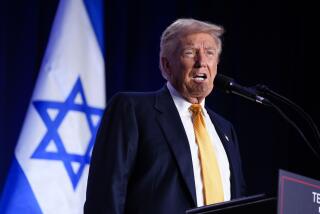Judging the candidates
What kind of justice a presidential candidate would name to the Supreme Court isn’t just a legitimate issue; it’s a vital one. It acquires additional importance from the endless agitation to overturn Roe vs. Wade, the 1973 decision legalizing abortion that Sen. Arlen Specter (R-Pa.) rightly has referred to as a “super-duper precedent.” Our view is that a presidential candidate should say whether he or she would appoint justices likely to upend that landmark case around which so many American women have shaped their lives.
At their debate in Las Vegas last week, Democratic candidates spoke plainly to that point, though only long-shot Rep. Dennis J. Kucinich said he would impose a pro-choice “litmus test.” Sens. Hillary Rodham Clinton and Barack Obama insisted that their nominees would share their views about “privacy,” the source of the right to abortion established in Roe vs. Wade. Sen. Joseph R. Biden Jr. concurred, explaining that a justice who embraced a robust constitutional right to privacy would uphold Roe. New Mexico Gov. Bill Richardson and former Sen. John Edwards said they would choose justices who regarded that decision as “settled law.”
Those answers are both responsive and responsible. They indicate to interested voters that the candidates would seek to appoint justices whose core principles -- either the right of privacy or a respect for precedent -- would make it likely that they would uphold Roe vs. Wade. Appropriately, however, most Democrats stopped short of saying that they would require a nominee to pledge his vote in advance on this or any other issue.
Republican front-runner Rudolph W. Giuliani also addressed judicial appointments last week in a speech to the Federalist Society, a conservative legal group. But where the Democrats were circumspect but clear, Giuliani was crisp but confusing. Without mentioning Roe vs. Wade, the former New York mayor endorsed “originalism,” which he defined as the belief that the Constitution “should be interpreted as it’s written, not as someone would like it to be.” Many conservatives consider Roe the quintessential non-originalist decision, so Giuliani’s comment was music to his audience’s ears, even if some words were missing. But the next few notes of his speech sounded a slightly different tune.
“We need judges who embrace originalism, endeavor to determine what others meant when they wrote the words of our Constitution,” Giuliani went on. “Justices like Justice Scalia, Justice Thomas, Justice Alito and Chief Justice Roberts. That would be my model.” Those four justices aren’t interchangeable on whether Roe vs. Wade should be overturned, though it’s a fair assumption that they all think the case was wrongly decided at the time. In a decision this year in which all four voted to uphold a federal ban on so-called partial-birth abortions, Thomas and Scalia wrote a separate opinion making it clear that Roe should be junked. Roberts and Alito didn’t go along.
At their confirmation hearings, moreover, Roberts and Alito acknowledged that long-standing precedents shouldn’t be lightly overturned (that would cause a “jolt” to the legal system, Roberts said) and that Roe vs. Wade had to be numbered among such precedents. Specter, whose pro-choice views almost cost him the chairmanship of the Judiciary Committee in the last Congress, said that “on the critical question of a woman’s right to choose, [Alito’s] testimony was virtually identical to that of Chief Justice Roberts.”
Roberts and Alito could move toward the Scalia-Thomas position in a future case that directly challenged the constitutionality of Roe. For now, they are hardly the clones of Scalia and Thomas that Giuliani suggested they were. Which raises the question of whether Giuliani, who is personally pro-choice, was deliberately sending not just a mixed but a muddled message.
More to Read
Get the L.A. Times Politics newsletter
Deeply reported insights into legislation, politics and policy from Sacramento, Washington and beyond. In your inbox three times per week.
You may occasionally receive promotional content from the Los Angeles Times.










